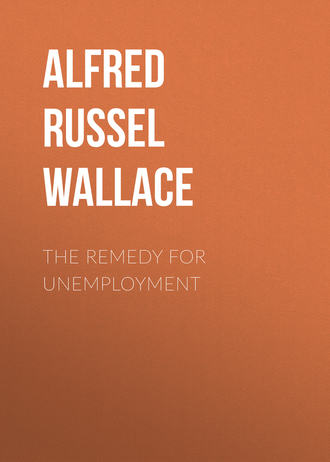 полная версия
полная версияThe Remedy for Unemployment

Alfred Russel Wallace
The Remedy for Unemployment
THE REMEDY FOR UNEMPLOYMENT
BY DR. ALFRED R. WALLACEThe reason why I wrote the present pamphlet (which first appeared in the “Socialist Review,” and is now reprinted in a slightly modified form) was that, although there is a small body of avowed Socialists in Parliament, not one of them has, so far as I am aware, upheld any of the fundamental principles of Socialism as a means of dealing with the greatest of present-day problems—that of chronic unemployment and starvation all over our land. Let me illustrate what I mean by a few examples. Perhaps the most fundamental and universally admitted axiom of Socialism is that all production should be, primarily, for use and not for profit; and the next in importance is that the true or proper wages of labour is the whole product of that labour.
But neither in Parliament nor out of it has a single voice been raised to show that these principles must be adopted in any permanent solution of the problem, or to explain how they can be applied far more easily and economically than any of the suggested alleviations. All the talk has hitherto been of securing trade union rates of wages for out-of-works of every kind; and the underlying idea has always been that of the non-Socialist worker—that the Government provision of work must not be looked upon as permanent, but only as enabling the worker to live till the capitalist employer again requires him.
An equally non-Socialist view was put forth by one of the most respected Socialists in Parliament when he advocated the immediate construction of light railways all over the country in order that when labour was brought back to the land the products could be carried economically to market, implying that the “products” were to be sold, thus competing in the market with those of other producers, lowering prices, and altogether ignoring the great Socialist principle of “production for use.” In the discussion of this question it has been totally overlooked that by a proper organisation of the labour of the permanently or temporarily unemployed, as well as of all those whose employment does not supply them with the means of a thoroughly sufficient and healthy existence, all the necessaries and comforts of life can be produced in our own country, just as they were produced down to a few centuries ago. I will now proceed to the exposition of the whole subject.
In order that those who have not read the Labour Party’s Unemployed Workmen Bill may understand why it could not have succeeded, a short statement of its essential provisions may here be given.
The first clause provides that the “Local Unemployment Authority” under this Bill shall be the council of every borough or district of over 20,000 inhabitants, and for the rest of the county the “County Council.” Clause 3 declares that “it shall be the duty of the Local Unemployment Authority to provide work for him” (any workman registered as unemployed) in connection with one or other of the “schemes” hereinafter provided, “or otherwise,” or failing the provision of work, “to provide maintenance, should necessity exist, for that person and for those depending on that person.”
This is the essential part of the clause, with a condition that the wages are to be “not lower than those that are standard to the work in the locality.” Then there is to be a Central Unemployment Committee to “frame schemes,” and generally look after the Local Unemployment Committees, which are to be established by every local authority, and are also to “frame schemes”; and the “schemes” of the four or five hundred local authorities are all to be submitted to the Local Government Board for revisal or approval. Nowhere is any guide given to the essential principles which should underlie these hundreds of schemes, and we can easily imagine the delay, the confusion, the cost, and the almost certain failure of “schemes” initiated in so haphazard a manner.
The whole conception of the Bill is, in my opinion, wrong. Unemployment is not a local phenomenal, but national, and even world-wide. It is a symptom of disease in our existing civilisation, and must be treated, if with any chance of success, on broad national lines, and with national resources. Even the one definite suggestion in the Bill—that “schemes of national utility” might be undertaken to employ the out-of-works—however good in itself, was here altogether out of place. For such schemes—afforestation, reclamation of foreshores, drainage works, roads, etc.—are all either not reproductive at all, or not for many years, in the meantime increasing taxation, and thus perhaps producing further unemployment; while they could only employ a mere fraction of those in distress (none of the women) and, when completed, would leave the problem exactly where it was when they were started.
The discussion in Parliament showed a clear recognition of the fact that it is quite impossible to remedy such chronic and widespread unemployment as exists now by finding work for the half-starved population in the hundreds of different occupations at which they have been engaged; but, strange to say, no one seemed to be aware that it is by no means impossible—that it is, in fact, comparatively easy—to enable these same people to produce for themselves the primary necessaries of life which are their immediate and permanent need. What is required is to organise and combine the whole of the unemployed into local groups, each group or community being primarily made up of a due proportion of workers who have been engaged in the production of some of these necessaries, and who will form a nucleus for the training of others for similar work. These various occupations are comparatively primitive, and there is every reason to believe that they will be found among the unemployed in about the same proportions as in the whole population. The thorough organisation and careful supervision needed cannot, however, be left to the random, and often antagonistic, opinions of hundreds of local authorities, but must be undertaken by the Central Government itself, and that only when the guiding principles and the practical procedure have been carefully thought out, clearly defined, and fully discussed in Parliament, before being embodied in law. It is pre-eminently a work to be devised and carried out by the Executive Government itself.
I will now endeavour to show in some detail how this can be done, what will be its results, and what are the various facts and arguments which render its success a certainty if it is fully and honestly carried out.
The recent discussion of the problem of unemployment, both in Parliament and in the Press, affords a remarkable proof of how difficult it is to enforce attention to new methods of dealing with great social problems, if such proposals are made a little before their time. Thus only can it be explained that not one Liberal, Labour, or Socialist Member of Parliament seems to be aware that a thorough and carefully-worked out scheme for dealing with the unemployed problem was published about twenty years ago, was re-issued a year or two later in a cheap edition by a well-known London publisher, was widely read and greatly admired, and—as was to be expected at that time—was very soon forgotten. I feel sure that this book must be in many public and private libraries, especially those of Liberal or Radical Clubs, but neither by Members of Parliament nor by any writers in the reviews have I once seen it referred to. Yet its title alone should have caused it to be read at this time, since it so fully and clearly states the problem which has received so much attention, but no solution, during the last few years. It is as follows: Poverty and the State, or Work for the Unemployed; An Inquiry into the Causes and Extent of Enforced Idleness, together with a Statement of a Remedy Practicable Here and Now. By Herbert V. Mills. London. Kegan, Paul, Trench, and Co. Price one shilling. 1889.
Now, this book is pre-eminently a practical one, and the bold claim in its title is fully justified by its contents. Mr. Mills was a Poor Law Guardian in Liverpool for many years, where there were nearly three thousand inmates of the workhouse. He thus had unusual opportunities of becoming acquainted with the poor, and of studying the various problems of pauperism, such as unemployment, food-supply, the various occupations of paupers, and other matters. He further obtained information and advice from experts in agriculture, and in the various trades and occupations of the men who came under his notice, and has thus been able to give us detailed estimates and calculations of the greatest value in formulating practical methods of utilising the labour of the unemployed to the greatest advantage, for their own benefit. He also visited and carefully inquired into the detailed working of the various Dutch Beggar and Labour Colonies, and obtained from them valuable information as to the methods that tend to success, as well as of those that either diminish the success or lead to failure.
Having myself encountered many disappointments in books, claiming to expound new and important ideas both in physical and economic science, I was fully prepared for another failure here. But I quickly found that this was really what it claimed to be, and I at once did all I could to call public attention to it, first in one of my annual addresses to the Land Nationalisation Society (in 1892), and much more fully in a chapter I wrote for Edward Carpenter’s Forecasts of the Coming Century, published in 1897. This chapter I republished, with some important additional facts and arguments, in 1900, in my Studies, Scientific and Social; yet all appears to have been in vain. If the authors of the “Unemployed Workmen Bill” had drawn it so as to follow closely Mr. Mills’ scheme, and had fully explained this scheme in their speeches by means of the facts, illustrations, and methods so well and concisely given in his book, I feel sure that the result of the debate would have been very different, and that not only Socialists, but the whole body of Labour Members, a large majority of Liberals, and even many Conservatives, would have voted in its favour; in which case the Government would have been obliged either to adopt it, or to bring in a Bill of their own on similar lines.
The chief reason why Mr. Mills’ scheme, if embodied in a Bill, should, and I think would, receive the support of a large majority in the present House of Commons is, that it utilises and combines in an admirable manner the most important, and at the same time the least disputable, methods of both Socialism and Individualism. To illustrate this I will give a few condensed extracts from his summary of the main features of his proposals, with some remarks of my own.
(1) In each county or union, tracts of land from 2,000 acres upwards shall be purchased or taken over by the State or Local Authority, and be prepared with suitable houses, buildings, tools, machines, etc., for the accommodation of about 4,000 or 5,000 occupants, men, women, and children; with skilled foremen and organisers to carry out the various operations of agriculture, and the trades and manufactures required to produce food, clothing, and other necessaries for the inhabitants.
(2) It is shown, by the facts and calculations of experts, that the labour of a properly assorted population, for four hours daily, will, when in full working order (say after a year), produce all the necessaries of life in abundance. One hour more is added for the costs of skilled supervision and another hour for the maintenance and schooling of the children, and for the support of the aged and the sick as they arise.
(3) In order to effect this the ordinary methods and rules of the best kinds of industrial work must be adopted; but, after working hours, all will be as completely free from control by the various industrial officials as the people of any prosperous and well-ordered town or village.
(4) That the director of each of the Co-operative estates shall encourage the workers to make their homes and work-places as healthful, convenient, and beautiful as possible, giving them advice as to how this can best be done, and assistance in doing it.
(5) That for work done co-operatively no money wages shall be paid, the equivalent of such work being the whole net produce of the labour. This will be—the provision of comfortable homes, abundance of good food and fuel, with a good supply of clothing, the latter being chosen by each person from a variety of suitable material and design kept in the stores. In addition to this, the children would all receive the best education, and as they grew up would each be trained in accordance with their faculties or tastes, in two or three useful occupations.
At least four-fifths of all the work on the estate shall be done for home consumption, not for sale.
(6) Every worker will be enabled to employ his spare time for his own use or profit, so as to obtain any luxuries or pleasures he might desire. Some would have land on which to raise choice fruits or vegetables for sale; others a workshop; the young women might do dressmaking, or open shops for the supply of small luxuries not produced co-operatively. All they required would be supplied at wholesale price, to be repaid by instalments out of the profits.
On this subject Mr. Mills well remarks: “I can easily imagine that for the sake of the retriever, the pigeons, the tobacco, the poultry or rabbits, the greenhouse, the bicycle, the piano, the library, the concert, or the theatre, many morning and evening industries would spring up quickly, without any other stimulus from the director than that which exists in every human heart. The acquisition of the luxuries of life might well be left to the ingenuity and activity of private enterprise.”
I would myself further suggest that the rules and restrictions on these estates should be as few as possible, and only such as are absolutely essential for the comfort and well-being of all. Especially should all healthful amusements and social enjoyments be provided for; while such serious offences as repeated drunkenness, immorality, or violence should be punished by absolute dismissal or expulsion.
It should be made quite clear from the first that these estates or colonies are established for the provision of permanent and enjoyable homes for all who desired to take advantage of them, not as mere temporary shelters in times of depression. There would, of course, be no compulsion to remain, but anyone who was dissatisfied with his surroundings and left could not again be admitted.
Another point of importance is, that the organisation of the whole community under an official director, whose rule must necessarily at first be despotic, is not intended to be permanent. When the colony became thoroughly self-supporting, and its inhabitants fully appreciated the benefits they enjoyed under the co-operative system, and had been gradually trained in the principles and methods essential to success, the organisation would be steadily modified in the direction of a self-governing community.
With this end in view, the Director, as well as the several heads of departments of industry, would, after the first year, each choose a few of the more intelligent and industrious workers to form small Consultative Committees. With these he would hold informal weekly meetings, to talk over the special affairs of their departments, and consider whether any improvements in organisation were advisable, either in the interests of the workers themselves or of the whole community who consumed or utilised the products of the work. Later on these committees might be added to by the introduction of workers chosen to represent the rest; or, perhaps better still, by the admission of those who had been longest in the community, and were therefore best acquainted with the needs and wishes of all its members. These would automatically become members after a certain period of work, the older retiring as the younger entered, and would ultimately constitute the whole committee. Suggestion-books should also be kept in the public rooms, in which every member, without exception, could, if he wished, make proposals or suggestions on any matter affecting the well-being of the whole community, or any section of it. These books would be examined by the committees and by the Director, who would decide upon their merits. Public meetings would also be held monthly or quarterly, at which the decision as to each of the suggestions would be announced, and the reasons why some were adopted and others rejected explained, while occasionally a suggestion would be given a trial and afterwards the opinion of a general meeting taken upon its adoption.
This plan was, I believe, first tried at Ralahine (in 1832) by Mr. E. T. Craig, and it has since been adopted by a few great industrial concerns with excellent results. It is found that useful suggestions are made by quite ordinary workmen, and even by boys, affecting both the convenience of the workmen and economy of production. But more important is its educational and moral value, which would be especially great in a co-operative association, by giving to every worker a definite status, and making him feel that he is not only a labourer in a great organisation, but that he is allowed to express his own views as to what is essential for the good of all. This feeling, and the careful attention given to all suggestions, tends to give confidence in the management, and ensures willing and thoughtful attention to duty.
But here some of my readers will no doubt object, how can it be shown that such estates or colonies could and would produce all the necessaries of life with such a comparatively small amount of labour? We know what John Burns told us of the enormous cost of the Labour Colonies at Hollesley Bay and Laindon; why should not these be equal failures? The answer is simple. The colonies now being tried, as well as that of General Booth in Essex, are a kind of rural workhouses, with no idea of permanency, no home life, no freedom of action, no prospect of a future. Neither is there any effective grouping of workers, no sufficient variety of occupations, no attempt at the production of all the necessaries of life by those who consume them. There is also, apparently, a large sale of produce in competition with outside workers, wholly different from the system of production for use which is the very basis of Mr. Mills’ scheme.
The scope of this scheme and its far-reaching and permanent effects on unemployment are totally unlike those of our present costly and temporary Labour Colonies. It would at once absorb the unemployed workers in scores of different trades and occupations, all being employed in supplying directly the wants of the community of which each formed a part. The wheat grown for food would employ millers, machinists, sack-makers, bakers, etc.; the sheep and cattle, supplying meat, milk, butter and cheese for all, would also by the intervention of tanners, curriers, saddlers, shoemakers, etc., supply all the leather goods; while the dairy outfit would require the work of tinmen and other skilled mechanics for the pans, pails, churns, presses, etc. The bones and horns might be used to make handles of domestic cutlery and for old-fashioned but useful lanthorns; perhaps combs and brushes might also be made, while the refuse fat would be made into soap for the use of the community. Wherever suitable clay occurred bricks and tiles would be made, as well as drain pipes and coarse pottery for various domestic uses. Even unlimited sugar for a population of 5,000 might be produced from home-grown beet-root with suitable pressing, boiling, and refining machinery. The wool of the sheep would be cleaned, spun, and woven into all the chief forms of clothing and household articles required; while flax grown, prepared, spun, and woven at home would supply the needful underclothing and linen of various kinds.
Artificers in wood and iron would be occupied in the supply and repair of carts, waggons, ploughs, and the simpler agricultural machines; while water or wind mills (or both) would give the power for the various kinds of machinery, for electric light and power-transmission, and probably also for warming and cooking purposes.
All these various industries would require a considerable engineering plant, and a body of trained workers, while a staff of joiners, cabinet-makers, plumbers, painters, and paper-makers, and in smaller numbers, compositors, printers, and book-binders, with store-keepers, clerks, and porters, would find constant or occasional work; and there would be comparatively few workers of any kind who would not be able to learn some one or other of these occupations, even if their own special skill in some less familiar industry was not called for. And besides all these, a considerable body of labourers would be wanted; and all adults as well as the older children would at times of pressure be called to assist in some of the varied forms of simple farm and garden work, such as hay-making, fruit-gathering, and harvesting.
An immense advantage of such an organised co-operative community (and one that can hardly be over-estimated) is the comparative certainty of returns and independence of adverse seasons that would thus be introduced into agriculture. Much of our hay is now deteriorated by cutting being delayed beyond the period of maximum nutriment, or damaged by not being dried and stacked at the earliest possible opportunity. But with a large and interested population close at hand, ready and willing to assist at an hour’s notice, and with the best machinery and appliances always ready, a single fine day in an otherwise adverse season might enable a hay or corn crop to be secured in good condition which, without this assistance, would be irretrievably ruined. And when everyone would be thus helping to save his own crops—the very “daily bread” that he himself and his family would enjoy during the coming year, the work, however hard, would become a pleasure, and every hour of the long summer’s day (or even of the night as well) would be utilised by relays of workers. We can well imagine with what determination and energy the work would be carried on, and with what enthusiasm and rejoicing would the holiday succeeding such an effort—a true “harvest-home”—be partaken of by all.
Another point may here be usefully dwelt on. Though at the first starting of such colonies it may be advisable to have large common dwellings and meals, it should at an early period be possible for all who wished it to have cottages or houses of their own; and these should first be provided for married couples and their families. These could, however, continue to take their meals (or any meal) at the common table, or in lieu of these could draw rations of food from the stores and cook for themselves. Home-life, so dear to many of us, would thus be rendered possible for all who wished it, while still retaining the economies and securities of co-operative work.
Yet further, keeping in view the one object of the establishment of these co-operative villages—that of enabling the unemployed to work profitably for themselves; if after a few years’ residence any of the workers wished to have the opportunity of trying an independent life on the land, he should not only be permitted to do so, but should be helped to obtain land for a small holding in the immediate vicinity, and, if his record in the colony justified it, have implements and stock provided for him, to be repaid by easy instalments. Thus might be exhibited, side by side, the comparison of men with similar training adopting the methods of co-operation and individualism; and the results, in the degree of comfort and contentment attained by each as years went on, would be exceedingly instructive.
With regard to the chances (or, as I maintain, the certainty) of the economic and moral success of colonies or villages organised with the one end of enabling people to provide by their own labour all the essentials of a secure, a happy, and a contented life, it may be well to adduce a few illustrative facts and results.
Between the years 1870 and 1880, workshops and a garden of fourteen acres were started at the Newcastle-on-Tyne Workhouse on which to employ the ordinary able-bodied inmates. In a very short time all the vegetables required for the whole of the paupers was easily grown, with a considerable surplus which was disposed of to local shopkeepers; and at the end of three years this land is stated to have produced a profit of £339 annually. In almost every department of work more goods were produced than the house required, so that a reserve of a two years’ supply of boots and shoes was accumulated, while the whole of the inside fittings of new wings to the workhouse were executed by the inmates.1









